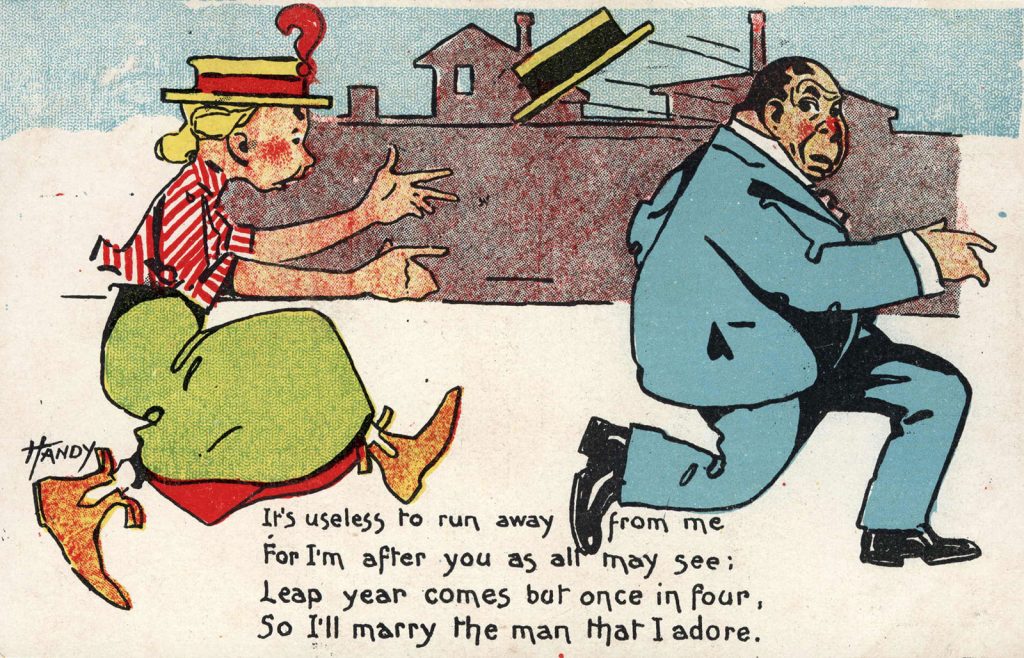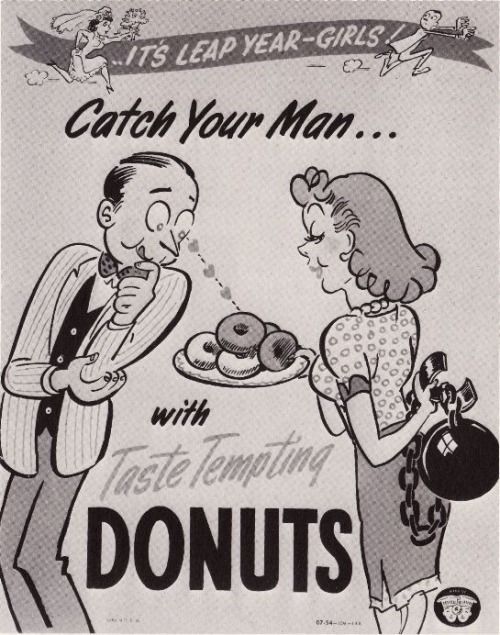
Coming of age as a woman in the sixties, no one ever told me about the Leap Year tradition that women could ask men to marry them during a year that included February 29. That means in 1964, my first year at college, I could have proposed to a guy, except there was no one remotely interesting to me as a marriage prospect at age eighteen. By 1968, I was engaged to be married, so too late. But never mind marriage proposals. During my dating years, it was unheard of for a woman to make the first move and ask a man out, let alone propose marriage.
I remember feeling passive and helpless when it came to dating.
Recently, someone told me about a young woman who liked a guy so she called and asked him out on a date. That would never have happened in my era. In high school and college, I remember feeling passive and helpless when it came to dating. I could flirt and hope that might result in a date, or I could stay home and hide, a social pariah. Those were bleak times socially.
The sixties supposedly ushered in the great social and sexual revolution, but as a college student back then, I remember the rules for girls (folks didn’t call us women yet) were not that different from high school. I guess I was a bit too old to have benefitted in this way from the changes brought on by feminism and the social upheaval that occurred after I graduated in 1967. In fact, although I was active in civil rights and anti-Vietnam protests, the men generally called the shots, just as they did with dating.
Here’s how I remember the dating rules during my years at the University of Michigan (1963-1967):
- If you didn’t have a date for Saturday night, you stayed in the dorm or your apartment with other women in the same predicament.
- Flirting and hoping to meet guys at mixers or in classes was permissible.
- If you were asked out at the last minute, say on a Thursday night for Saturday, you turned down the date because it was a breach of dating protocol.
- Asking guys out was never done. Not even to meet for coffee. That wasn’t a thing back then.
- Women did not go out together on weekends. No date meant no movies or concerts or dances.
- If you were living in a dorm or sorority house, you had “hours,” which meant you had a curfew to meet. The punishment for arriving late fell on the woman, who was generally grounded or given an earlier curfew for the next weekend.
My brief fling with sorority living ended when I refused to attend a candle lighting ceremony because I had gone out with my future husband. Those ceremonies were the worst. All of the girls stood in a circle and passed a candle while singing an insipid song about waiting for a guy to choose them. On the second pass of the candle, the girl was who blew it out was pinned, meaning a boy had made a commitment to her by giving her his fraternity pin. On the third pass, blowing out the candle signaled an engagement. I hated those ceremonies. Women were passive recipients of men’s largess. The song lyrics included the words, “… She is loyal to the Gold and Blue (Michigan’s colors), and she will always be loyal to you. He is the greatest guy, and she can tell you why. He chose the best from all the rest…“ Wow, that happened in 1965.
Thank goodness 55 years later, in 2020, Leap Year only suggests an extra day, and a woman can issue an invitation to a man, woman, or other-identified person to go out on what we used to call a date.
I invite you to read my book Terribly Strange and Wonderfully Real and join my Facebook community.
Boomer. Educator. Advocate. Eclectic topics: grandkids, special needs, values, aging, loss, & whatever. Author: Terribly Strange and Wonderfully Real.





Wow, Laurie, you took us on quite a journey with this little story! Having not gone to university, I wasn’t familiar with that candle-lighting ceremony (and not that I would have been in a sorority had I gone) — insipid, indeed. And those cartoons would be hilarious if they weren’t so shockingly sexist. Isn’t it something to be of an age where racial/gender/ethnic/religious stereotypes can be seen in the perspective they deserve, thereby defanging them. Well told!
Well said, my friend. While things are far from perfect for women these days, it is certainly a less restrictive time with many more opportunities.
Laurie, though I am younger than you, I still abided by the same rules. I wouldn’t dream of asking a guy out on a date. There was one semi-formal dance at my high school where we asked guys. I wrote about that in my story “Lanny”; I did ask my crush, at first he said yes, but then backed out, so I wasn’t even successful at that.
I deliberately did NOT go to Northwestern (I chose not to attend Michigan, as I wanted to go further away from home), though I got in, once I learned that social life revolved around Greek societies. I was still traumatized by the cliques from junior high school and didn’t want anything to do with any place that could reject me again!
We used to call those Sadie Hawkins dances and I really didn’t associate them with Leap Day. I think it took a very self-assured young woman to ask a guy out, much less ask him to marry her.
I remember your painful story about Lanny, Betsy. Looking back, it would have been nice to be free to do the asking rather than feeling so passive.
Oh, wow, Laurie, I can relate to those rules. The big change for me came between high school (when your rules applied) and college, when everything basically blew up. I never attended one of those candle lighting ceremonies but I knew about them. They had been a tradition at Mills up until the year before I got there, when the ceremony was trashed. Thankfully it is just a part of college history.
I think you were just young enough to have enjoyed a bit more freedom as a coed (wasn’t that a funny thing to call us?).
Laurie, those illustrations you found are amazing! And you do a great job of describing exactly what the dating rules were in the Sixties, at least for most of the decade. It wasn’t quite that bad during my college years (1968-72), because that was right when the women’s movement took off, but still I don’t think I would have asked a guy out on a date. Your #6, which we called parietals, were a big deal for my first 1 ½ years of college, but then we got co-ed dorms, which meant those rules were gone. And I didn’t go to a school with sororities, thank goodness, so was never exposed to those dreadful ceremonies.
We did have a Sadie Hawkins Dance every year in high school, where the girls asked the boys, but that was based on the Li’l Abner comic strip, which had Sadie Hawkins Day every November, and had nothing to do with Leap Day. I wrote one of my very first Retrospect stories about that.
Suzy, those rules were so restrictive, as was my brief stint in a sorority. Hard as things still are for women, at least there are many more choices.
Right you are, Laurie, by about 1972 everything had changed, even at Mills. My first year we had house mothers (can you believe it?) and had to sign in and out of the dorms. Then there was a giant “sleep in,” when everyone invited a guy (either boyfriend or just a friend) to stay over, and that ended all the rules. Of course we had just about all women in dorms until the weekends, when boyfriends appeared. Mills was so small that sororities would have been pointless. I’m so glad I didn’t have to deal with them, sounds awful.
I remember house mother and, during my time at Michigan, there was only one dorm that housed men and women. So men were not even allowed to visit our rooms, as I recall. And yes, Marian, my brief experience as a sorority sister was a radicalizing experience for me.
Laurie, why don’t I remember that girl-asks-boy on Leap Year?
What chances I missed!!!
Or did I know and have forgotten?
I guess it’s OK Boomer!
Ok Boomer — we really lost out on opportunities to date the person of our choice back then. So glad things are different for my granddaughters.
And reading Marian’s comment about dorm life reminds me that in the mid 60s I was living in an all women’s graduate dorm and men were not allowed in our rooms, and we had curfews – and we were graduate students, all at least 21!
How times have changed!
Looking back, that was pretty sad that 21 year old women could not be trusted to set their own hours or entertain men. Pretty pathetic.
I love this, Laurie. My college years were 1971 – 1975. The dating rules weren’t all that different than what you describe, lots of waiting for the phone to ring. I had no sorority experience; that ritual sounds just awful. The art is amazing and terrifying too, and as you say, not so very long ago. Being at UC Davis, on the west coast, hippie era and all that, I have to say, while all the “girls” were taking the pill and “women’s liberation” was supposedly a thing, in terms of dating and relationships, not much had really changed.
I assumed things were better for women in college in your era. I know for a fact that they are quite different for my granddaughters. While they are still in middle school, I don’t think dating is much of a thing. Nor is gender identification or sexual preferences in my neck of the woods. They just go out with whomever to have fun. A nice change.